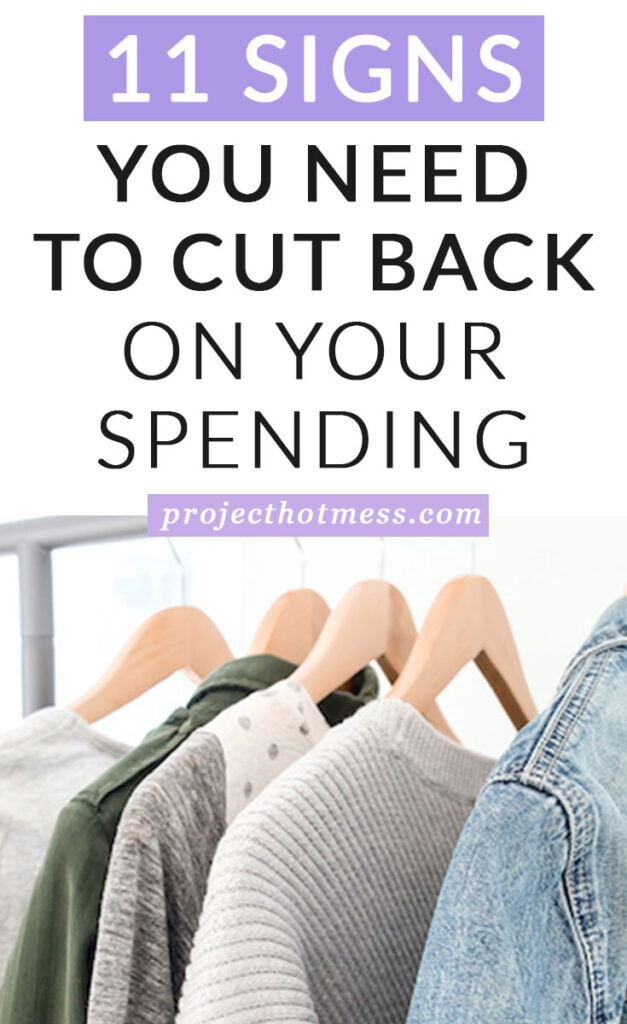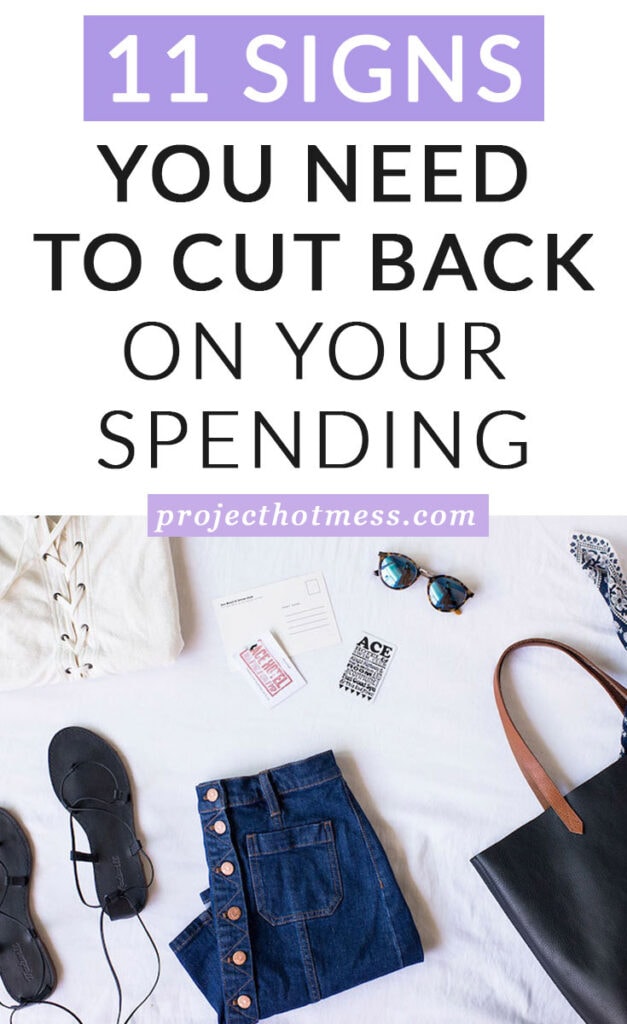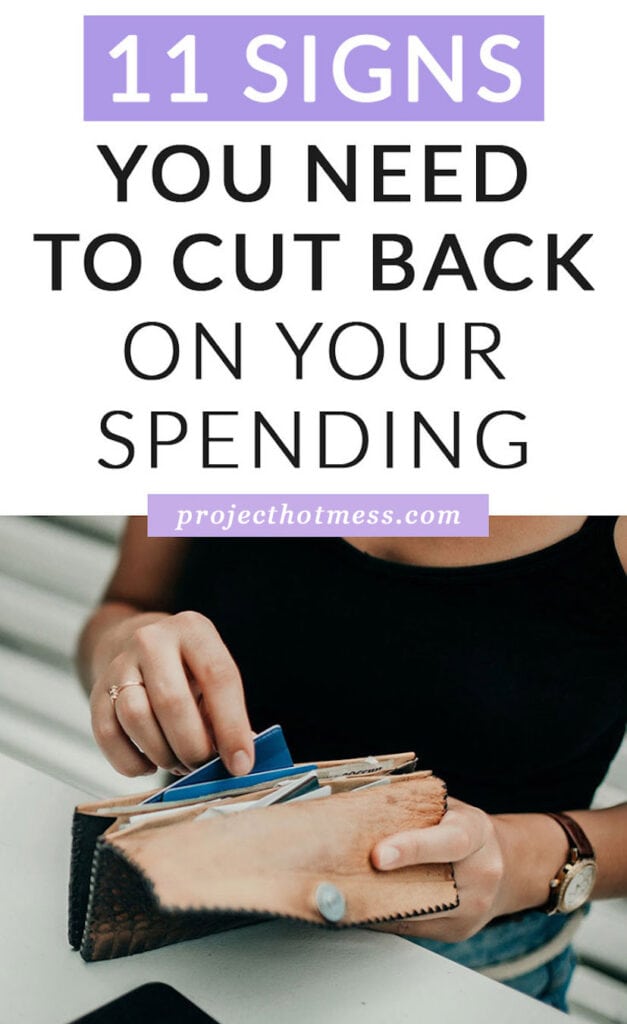11 Signs You Need To Cut Back On Your Spending
Feel like you’re spending just a bit too much money?
Chances are if you’re reading this article, then you’re worried you’re going to fall into the ‘need to cut back on your spending’ category.
Or perhaps you’re already sure you do.
Either way, here are some surefire signs you need to curb that spending habit before it’s too late.
1 – You Can’t Pay The Balance On Your Credit Card
If you’re relying on your credit card to pay your bills, act as your emergency fund or if you use your credit card for everyday spending, then you need to consider that you may need to cut back on your spending.
If your credit card balance is more than you can pay off at the end of the month, and you are incurring interest, then you need to stop putting extra charges on it until it is paid (and reduce the limit on your credit card while you’re at it!).

2 – You Don’t Have An Emergency Fund
Your emergency fund is your safety net, it’s not your credit card and it’s not your savings account. It’s meant to be there in case a big financial emergency pops up and you need the money… now.
Emergency funds reduce your stress and anxiety around money and give you the freedom to know that if something were to arise, you were covered. If you don’t have an emergency fund, you need to stop spending frivolously and get one set up.
3 – You Buy Something Every Time You Go Shopping
Are you the kind of person who can’t walk into Target without walking out with an armful of things you didn’t even realise you wanted/needed? You may have a spending problem.
Habitual spending like this can land you in trouble because you can’t control it. You spend money mindlessly and it will lead you to be in more debt and not in control of your finances.
Avoid stores or learn what’s triggering these behaviours and stop overspending.

4 – You’re Living Paycheck to Paycheck
Living paycheck to paycheck is such an unstable way to ‘manage’ your money. If you can’t make your paycheck last between your pay cycles then you need to learn to budget better and spend less money.
Regardless of how much money you earn (high income earners live paycheck to paycheck too), you should have a system in place that allows you to project your expenses and manage your finances.
5 – You Have No Idea How Much Money You Spend Each Week
How much money did you spend on groceries last week? Or clothes? Or makeup? Or dinners out?
While you don’t necessarily need to know every single cent you spend, it is good practice to have at least an idea of how much money you’re spending. If you can’t tell, or if you’re spending more than you can keep track of, then you may need to reevaluate your spending habits.
One of my most favorite tools for managing and tracking my money is PocketSmith. It syncs all of our finances, including our loans and assets – which means it shows us our overall wealth. It’s also great for finding and tracking changes in our spending (so we can budget accordingly). I’ve tried so many different apps and this is the only one that I loved. PocketSmith is so easy to use and my husband loves how he can see how much we have left in our budget at anytime.

6 – You Have To Borrow Money Off Friends Or Family
If you’re needing to borrow money from your friends or family, or relying on someone else to pay your bills for you, then you need to cut back on your spending and start paying your own way.
This falls into the same category as living paycheck to paycheck. It’s all about getting smart with your finances and not hiding from them anymore.
7 – You’re Only Making Minimum Repayments
If you’re only making minimum repayments on your credit card or loans then you’re going to be in debt for a long time. You should always pay more than your minimum repayments, no matter how much extra that ‘more’ is.
If you can’t afford to pay more than the minimum repayments then you shouldn’t have gone into that debt in the first place and you need to cut your spending so you can pay extra repayments.

8 – You Have No Savings
Have a stellar wardrobe but no spendings? While you might consider your Birkin to be an ‘investment’, it’s not going to pay your bills for you, and you can’t use it as a downpayment on a house.
Financial advisors recommend you to save 10% of your income, but it depends on your goal. If you’re still paying down debt, you may put a smaller amount towards savings and more towards your debt payments (as long as you have an emergency fund).
Regardless of how much you save, you need to be saving. Not sure how? Stop spending money on takeaway coffee and save those dollars instead – see how quickly it can add up!
9 – Your Bills Are Paid Late
The problem with paying your bills late (other than the fact that you’re paying them late) is that they incur late fees and charges, which means they cost you more money!
If you’re adult enough to have bills then you need to be adult enough to pay them on time. Set up automated bill payments so you’re never late and make sure you have enough money in a separate bills account to pay them (otherwise you’ll end up with overdrawn fees on the account too).

10 – You Can’t Afford Your Phone Bill But You Have The Latest iPhone
If you’re wielding the latest iPhone, but your phone connection is about to be cut off because you can’t afford the payments, then you need to seriously reevaluate your spending habits.
If you’ve got the latest iPhone, then you’re probably the kind of person who likes to keep up with technology and trends. Which means the iPhone isn’t the only ‘latest’ thing you have. Therefore, you probably like to spend money…
But do you know what’s better than spending money? Paying your bills on time. Do it. It’s called ‘being an adult’.
11 – Talking About Your Finances Makes You Anxious
If talking about your finances, or even reading this article, makes you feel anxious then you probably have a lot of negative feelings towards money based on your experiences with it. If you’re anxious about money then you probably spend too much of it.
The best way to deal with financial anxiety is to learn how to gain control. It’s just money. You control it. Learn as much as you can about personal finance, how to manage your money, money mindset, and how to budget, then put it all into practice and see how differently you feel about money.
You don’t have to completely give up spending money on the things you love, but if you’re doing any of the above, then you probably need to consider cutting back your spending.






















